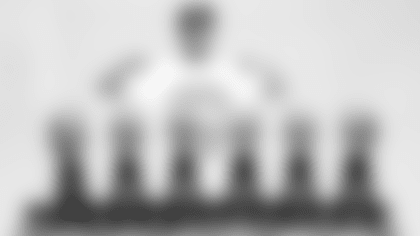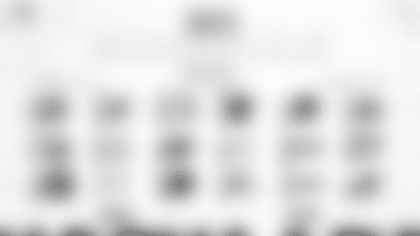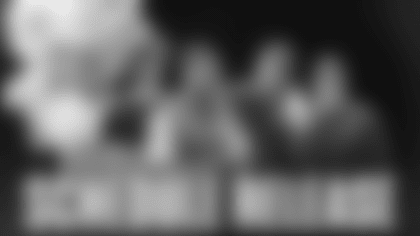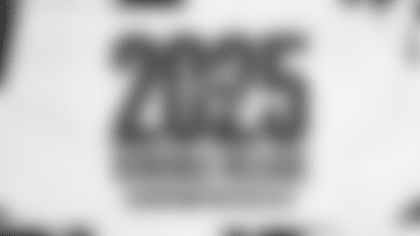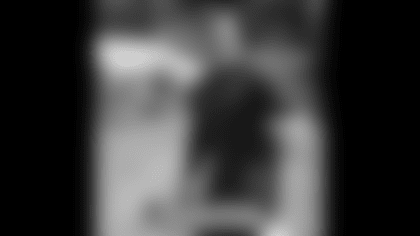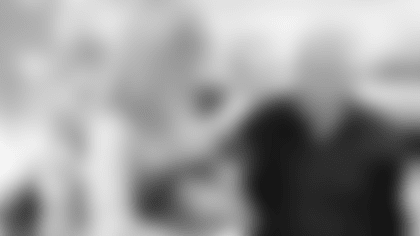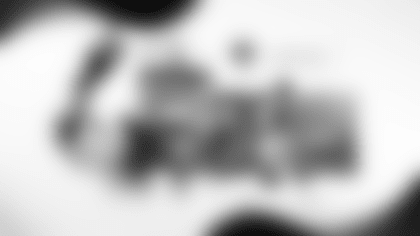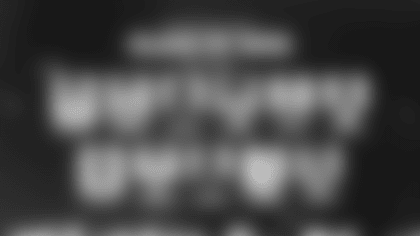BB:Just looking at the Dolphins here, it looks like when we played them before was kind of at the end of a little bit of a bad stretch for them but they've certainly played well lately. They've won four of the last six and been real competitive in the two games they dropped. Just solid all the way around, do a good job in all three phases of the game. Still real fast and physical on defense. They make plays in the kicking game, blocking punts and [Marcus] Thigpen's been dangerous back there. It looks like they're getting just a little bit of a groove there offensively too; good balance with the running game and passing game. [Lamar] Miller has run the ball well. Obviously, a good group of receivers and athletic quarterback. Good, they're playing well, doing a good job; good coach. Joe [Philbin] is doing a good job. It looks like they've improved. I'm sure that Coach Philbin is working them hard and you can see them doing things better really every week. It was a good win for them in Pittsburgh last week. It will be a big challenge for us this week down there, always is.
Q:Olivier Vernon has 11½ sacks. What have seen from him this year compared to last year that allowed him to escalate his play to a high level?
BB:I think obviously he's just gotten a little bit better with experience. They play him some inside and outside. He's a versatile player that's got a really good set of skills, like he had in college. He's got good quickness, he's strong, he runs well. He makes some plays in pursuit, chasing the quarterback out of the pocket and things like that. He's a good technician. He's developed definitely better technique in his pass rush than what he had as a rookie. They have a real good front and this guy is a good player.
Q:When Shane Vereen was at Cal, he had a couple catches a game. When you were looking at him, was that something you projected he'd be able to do? What makes him so good being used that way in your offense?
BB:I thought he had good receiving skills at Cal in [former Head] Coach [Jeff] Tedford's offense there. He was used in the passing game and obviously they had a lot of good receivers too. I don't know how many times we threw him the ball last week, it was like 17 or 19, whatever it was, I'd say quite a bit out of the normal for any back. Shane does a good job, he's got good quickness, he's got good instinctive receiver skills, kind of when to make decisions relative to leverage he's being played with, the coverage – man, zone – linebacker leverage and so forth. He's dependable in blitz pickup which is important because really no matter what kind of receiver a back is, if he's not dependable in blitz pickup, it's hard to get him in the game. Obviously Shane does a good job with the ball in his hands.
Q:Is it feasible to ask defenders not to target the knee, in addition to the head?
BB:That's probably not really a question for me. It's something you should probably refer to the league and the rules committee and all that. I guess you can make anything you want because that's what it is right now – whatever it's been made to be, that's what it is. So, I'm sure you could make it into whatever you want beyond that.
Q:Have you ever heard of the proposal by some people to take helmets out of the game and that would make the game safer?
BB:I don't think I've been part of that discussion. We've made an awful lot of changes to the game here in the last few years to supposedly make it better, but we've had a pretty good game.
Q:What have your impressions been of Sealver Siliga? What did you think of his work on Sunday?
BB:I think he's a hardworking kid. He's improved a lot since he's been here. I think some of the things we've asked him to do are a little bit different than what he's been doing but he's adapted pretty quickly. Spend a lot of extra time here working on his technique and some conditioning in the weight room. I thought he hung in there and played real competitively last week against Cleveland. Obviously, a young guy, long way to go but I thought he definitely did a lot of positive things.
Q:How much does the role of a former Broncos staffer in your pro personnel department play in you guys initially signing him to the practice squad?
BB:I think our pro personnel department, that entire group, does a good job of staying on top of players in the league throughout the year, whether it's in the spring in the free agency period or whether it's in the training camp pre-53-man cut period or now in the season when the rosters have been all set but there's still some personnel movement. I think Nick [Caserio] and that entire staff do a good job of staying up on the personnel and I'm sure everybody in that department contributes to that.
Q:How impressive to you is Stephen Gostkowski's past two weeks with what he accomplished with two 53-yard field goals against Houston and the 50-yarder against Cleveland? Can you think of a time when he has performed more in the clutch when you really needed him in his eight years?
BB:He's had a couple of pretty clutch weeks. I think it would be hard to be much more clutch than that. I think you hit it on the head. So much of whatever a kicker does is just based on opportunity. You don't know – you have to be ready but you don't know when you come to the stadium whether you're going to be kicking field goals, kicking extra points, not kicking at all, onside kicking and so forth. Some of that is just by opportunity. You get into game-winning situations or onside kick situations – when is the last time we've onside kicked like that? So, it's infrequent but when it comes up, it means everything. That's really all the more impressive. I think part of it for Steve is just not only did he get it done, but it was a very infrequent play and it was at the most critical time and without it, we wouldn't have won. All those things are impressive.
Q:Is there a call you guys have or is that a conversation that's flowing in the second half, that it's worth taking a five-yard penalty for delay of game over using one of the timeouts in case you need them later? What's the thought process in terms of approaching that specific situation of the clock winding down and a quarterback taking the timeout to prevent the penalty versus letting the penalty happen and moving back five yards?
BB:It's a great question, certainly one that I'm sure everybody gives a lot of thought to. Start with the easy situation, easier: it's much more clear cut in the kicking game when you can, sometimes it's easier to afford the delay of game penalty since you're giving the ball up anyway, especially if you have good field position and five yards can be made up by the kicker on the kick. With the ball around midfield and that kind of thing, it's a lot easier to take that penalty. That's something that you go over with your specialists and your punter, your holder on field goals and all that – when you do, when you don't want to do it. I think that's a lot easier to define. With the quarterback, it's a great point that you bring up. Again, we've had games this year where we've needed timeouts at the end of the game and thankfully we've had them because they weren't used for other reasons, like as an example, last year in Seattle when we didn't have timeouts at the end of the game because they had been used in another point in the game. You know, in the end, it comes down to a set of guidelines that you have as a team. Ultimately of course, it's judgment by the quarterback. I think an experienced quarterback, a guy that's really been in the system and really knows not only what he's doing but knows what he's doing within the system and knows the offense thoroughly, when the play comes in late or the substitution comes in late or there's some kind of down-and-distance confusion about what you're calling or what you're not calling, again I think an experienced quarterback can sometimes just make a call and get the team out of the huddle and get them to the line of scrimmage and run a play. Maybe it's not the exact play that the coordinator would have called or was sent in, but it's a quick play that we can line up in that we know how to run that we've run before. Again, that's a lot easier to do on first down or second down than it is on third down. I think it's one thing to use a timeout on third down when you're talking about maintaining possession of the ball and all those type of things compared to on early downs when you still have at least one more down, if not two. I don't want to say the play's not important, but it's certainly not as important. It's a great question and one that we've spent many hours discussing as a staff and you can flip it right over to defense too. It's not different on defense of having some type of a miscommunication or 12 men on the field or the offense is in a different personnel group than what you thought they were in because you've missed a substitution or they've done it a little differently or whatever it happens to be and then do you want t be in that matchup? Is that more of a risk than using a timeout that you would want to save for later in the game? There are a lot of elements to the question and therefore the answer. Judgment by players on the field: defensive signal caller, quarterback, specialists, holder, punter, personnel protector, those all play into it. I don't know that there's any true textbook for a right or wrong decision, but I think the bottom line is judgment and making the best decision. A lot of times, that's just done by a good, instinctive football player on the field because everything isn't quite by the book. Depending on how much the team is confused or how important the situation or how easy it is to get into something that we are comfortable in, that's all part of it too. At different points in the game, it's certainly a key, key decision-making play that often goes unnoticed but it's good work to have one way or the other.
Q:You mentioned how infrequent an onside kick can be and Stephen Gostkowski said there are multiple different versions. Do you leave the sideline huddle knowing which one you've chosen or do you wait and see how the opponent is set up before giving some kind of signal on which one you're going to use?
BB:Again, as we talked about after the game, I'm just going to kind of bypass that question because it really gets into the strategy of the play. I do think that's important and what we can do, what we're going to do, what our options are, how we set it up, I think is something that I really just can't get into. But I think when you look around the league over the last few years, you've seen a number of different versions of onside kicks. You've seen, I'd say, 10 years ago, 15 years ago, 20 years ago, pretty much everybody did the same thing. You lined up everybody over on one side and kicked the ball to that side, with that type of kicker that the kicker kicks. Since the rules have changed, you can't overload the formation anymore and so forth. Now that's changed the onside kick strategy where I think you see a number of different types of kicks, even by the same team. I think that's changed it for everybody a little bit. It's just not as easy to get those overloaded formations. You just can't do it anymore – it's not easy, it's illegal, you can't do it. You have to take a look at what the situation is now. I think if you look at the numbers, which I don't have them right in front of me, but I'd venture to guess that the overall success rate of onside kicks – first of all you don't see very many surprise onside kicks anymore, probably that's because of the rules, but on the must-onside kicks, I think the numbers on those are down from earlier years, numbers. I'm talking about the last two or three years relative to before that because of the rules changes and what you're allowed to do. It's a lot tougher to do it.
Q:You mean the success rate is down when you say the numbers are down?
BB:Yes, the success rate. Yeah, you're going to do it when you have to do it. But as far as the – although I'd say that the lack of success on those kicks, that influences your decision on trying to onside kick when there's still time to go in the game. Like, if there's two-and-a-half minutes to go and you have a couple timeouts, do you want to onside kick and attempt to get the ball back when the percentages are very low versus trying to kick off, play defense and know you might not see the ball again either and have no chance to get it. I think that, I would just guess that off the top of my head that going back a few years, that there was more of a tendency like what happened in the Philadelphia Super Bowl with Andy [Reid], where you want to attempt that onside kick with time where you could kick the ball off deep but now I think that you probably see even less of that, that the onside kicks occur when it's more of a true desperation situation and you have no choice.
Q:When the quarterback steps to the line of scrimmage, is confused by the defense and calls a timeout, we've seen that frequently from other teams and it appeared that way on Sunday with Browns. In Tom Brady's case, given his experience and recognition, it seems like that never seems to occur with him. How important is that in your ability to save timeouts?
BB:Let me just make a couple comments on your question and then maybe you can rephrase the question, I'm not sure if I'm getting it right or not. First of all, nobody really understands this, but I can't think of a game, certainly not any recently, where there isn't some type of communication issue with either the headsets or the coach-to-quarterback system, where you either have to replace it, change the helmet which we've had to do several times this year, or the system just goes in and out because of, I'm not smart enough to understand why, because of the frequency or the frequency gets jammed or there's interference or whatever it is. One of the key people for us on the sideline is Dan Famosi who works with that system for us to try to get it operating smoothly and troubleshoot problems when they come up. He's really a very important key guy for us in the game, as well as during the week and all the other things he does around here. But anyway, it's not uncommon at all for the quarterback not to get the play that's called in or the defensive signal-caller for that matter, to not get the play that's called in because there was interference or he only heard part of the call and didn't hear the whole thing or whatever it is. Then that starts the process all over again. Of course you get the whole deal where the communication gets cut off at 15 seconds so if for some reason you're coming down to the wire there and you might have time to get the play called but now the quarterback can't hear it or the signal-caller cant' hear it because the 15-second mark has hit. That complicates it. Does the quarterback just call another play there or does he make the best he can out of it? Then there's another decision-making process there. In addition to that, as we all see, there are so many different personnel groups on the field and substitutions and when you have an injury in the game, like for example we had Sunday and you lose a guy who is in those personnel groups and then somebody has to replace him and then does that change where everybody lines up the next time you run plays. Because you can't have a backup for everybody, somebody had to back up multiple positions and so forth. There are some complications that get involved there. I'd just say the combination of all those things: the system not functioning at 100 percent, just the game management, the, obviously, variable of what's on the other side of the ball. What do they have in the game? Have they made a late substitutions? Do you they in what you think they're going to have in? Getting those plays, getting the plays and the defenses called, getting them done properly, getting them done without some kind of glitch is, I'd say, it's almost impossible that you're not going to have a few of those during every game. Again, what it comes back to is the judgment of the quarterback, signal-caller or whoever is involved there, well, 'Is this screwed up that we can't get it right? Can I fix it? Do we have time to fix it? How critical is this situation? Is it worth taking a timeout or can we just go out there and run one of our basic plays and get through it?' But, I guarantee you every team in the league deals with it on both sides of the ball. It's a serious part of the game that needs great judgment and management from the people on the field, both the coach and the signal-caller, the quarterback. Fortunately we have a great one in Tom who has dealt with everything you can deal with and more. He's been in our system a long time and I think he has a pretty good idea of when we would and wouldn't want to use timeouts or change plays and that kind of thing. But it's definitely a significant issue that is part of every game. Going back to Cleveland, I have no idea what did or didn't happen there. But I know it happened in the game to us. I'd say it happens in every game. We've changed helmets, we've switched headsets for the coaches, we've gone to multiple different systems to try to either change the issue or fix the problem, if we can just fix it right there on the field. But it's certainly something that you have to think quickly on, you have to have people that can react to it and you need somebody that technologically can solve the problem as well, that knows what they're doing and knows how to fix it.


